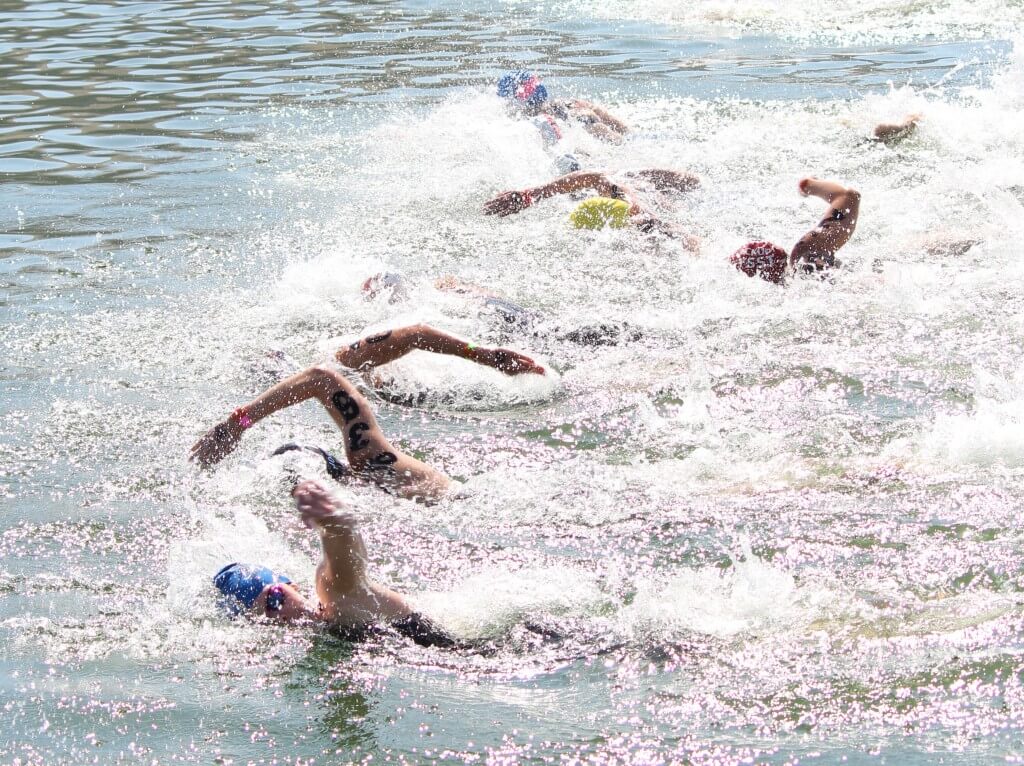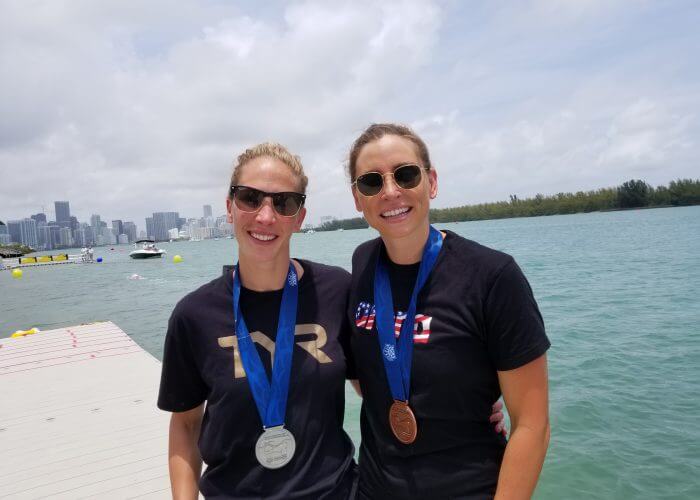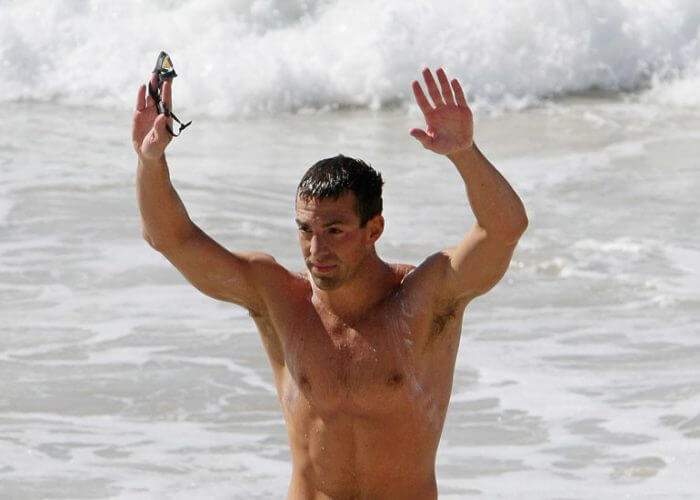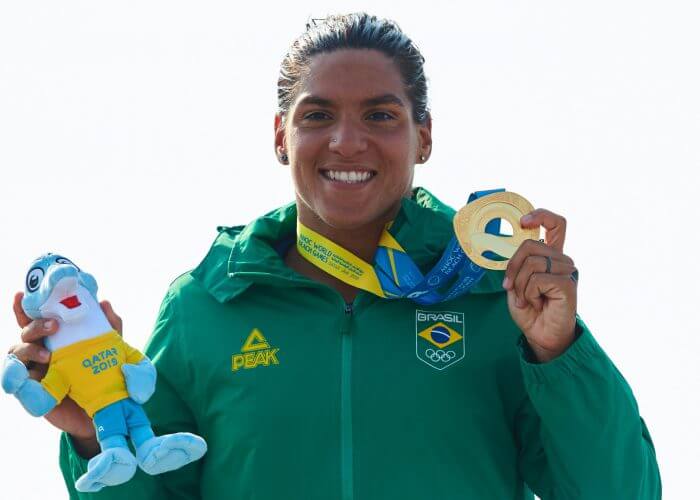Swimmers Say World Beach Games 5km Races ‘Trashed Fran Crippen Memory In Waters Over 31C’

Beach Games In Hot Water: Swimmers Say Race Took Place in Waters Over 31C Limit
The World Beach Games organised by the Association of National Olympic Committees (ANOC) stands accused by swimmers today of trashing the memory of Fran Crippen.
Organisers announced that waters on the course off Katara Beach, Doha in Qatar last weekend were measured at 30.9C before racing, inside the 31C limit imposed by FINA, the international federation, after the death of the American ace in a FINA World Cup race 2010. Swimmers now claim that the water was measured at 4am and that it was hotter than 31C by the time the actual racing was underway.
Sources suggested the thermometer read 32.8C at one stage.
At the same time, the winner of the women’s 5km race in Doha, Ana Cunha of Brazil, has raised fears that lessons learned through the death of Fran Crippen have been forgotten: in comments made in Wuhan at the Military Games, she confirmed that she is chasing hot water in preparation for the Tokyo 2020 Olympic Games because “we know that it is going to be hot in Japan”.
Just six days shy of the ninth anniversary of Fran Crippen’s death in waters and air temperatures that contributed to his passing, according to two inquiry reports, a leading swimmer who raced at the Beach Games last weekend told Swimming World that “it was 30.9C at 4am but the water temperatures were above the FINA upper limit during the race”.
Organisers stated last weekend that the water was tested at 30.9C, 0.1C inside the FINA 31C limit set in the wake of the tragic events that took Fran Crippen’s life off the coast of the United Arab Emirates on October 23, 2010.
Swimming World has asked organisers to confirm water-temperature readings during the race and on the course. Meanwhile, one world-class open water swimmer claimed: “The water temperature was 30.9C at 4am but by 6am it was somewhere between 31 and 32.”

Ashley Twichell and Haley Anderson – Photo Courtesy: Andy Ross
American aces Haley Anderson and Ashley Twichell and the entire Canadian team withdrew from the event last week on grounds of safety but officials allowed the race to go ahead in conditions that swimmers who raced now say were “unacceptable”.
One top-10 finisher now tells Swimming World:
“They measured it at around 4am and took that as the temperature by the time we were racing, it was hotter, over the limit and someone should have intervened. I’m really sad and even angry about this. It isn’t the first time they’ve trashed Fran’s memory and felt that it’s ok to push the line of safety.”
Two major international events held under FINA rules and supervision in the past five years have gone ahead in water temperatures over the 31C limit, leading to teams from Japan and the United States, among other individual swimmers, to withdraw.
In 2017, Fran Crippen’s coach, Dick Shoulberg, called on USA Swimming to put its foot down with FINA and demand an explanation and consequences after the 10km events at the Asian Open Water Championships were held in waters off the Malaysian coast at 31.9 degrees Celsius.
FINA official Ronnie Wong, who served as chairman of the international federation’s Technical Open Water Swimming Committee when it established rule OWS 5.5 (specifying temperature limits), gave the thumbs up to the race off the Malaysian coast.
Team Japan complaints fell on deaf ears. They withdrew but the race was allowed to go on.
The Doha event last weekend was also held under FINA rules and FINA supervision. The same was true when Tokyo held its marathon swimming test event last year and heat was not the only issue of concern.
Tokyo 2020 Test Event Raised Serious Concerns
In its coverage of the test event, the Japan Times noted: “In October 2017, Tokyo 2020 organizers were left embarrassed after tests revealed levels of E. coli bacteria more than 20 times higher than international standards, sparking doubts about the venue’s safety.
“At the time, the organizing committee blamed prolonged summer rain that had brought pollutants from offshore for the high readings between late July and early September. A year later, organizers said tests using underwater “screens” to filter the water had successfully reduced bacteria levels at the venue, which will also host the triathlon. Kida said the water was ‘a little stinky, and the clarity was not very good so I really want (organisers) to improve the quality’.”

Fran Crippen – Photo Courtesy: ABCNews.com
In response to the idea of filters being used, Peter Crippen, Fran’s father, told Swimming World:
“I know enough about water chemistry to say it is absolutely ridiculous to say they are using screens to filter the water from E coli. The only thing that will kill e-coli is APO advanced oxygen potential, or UV in open water neither is possible. The source must be eliminated. No screen will do it! Frankly, these people are either liars or just plain stupid.”
Many in the world of swimming share those sentiments, while athletes continue to report the same mantra of “too warm”.
Here are two of the quotes that leading athletes gave to reporters at the 2018 Japan test event for the Olympic course at Tokyo 2020 next year:
- “That was the warmest race I’ve ever done. It felt good for the first 2km then I got super overheated,” – three-time Olympic medalist Oussama Mellouli after the 5km.
- “The water temperature was high so I’m a bit concerned about that,” – Japan’s Yumi Kida, who “guzzled iced water before the race” in an effort to reduce her body heat.
FINA’s executive director Cornel Marculescu said at the time that the Tokyo 2020 race may go ahead at dawn for safety reasons: “Based on [water temperature and other tests], we will decide the time the event will start. Could be 5 a.m., could be 5:30 a.m., can be 6 a.m., can be 6:30 a.m. — depends on the water temperature. Working with a specialized company like we are going to do here in Tokyo, we will have the right information to take the right decision.”
Leading Athletes Chasing Hot Water In Readiness for Tokyo 2020

Ana Marcela Cunha – Photo Courtesy: ANOC World Beach Games
Brazil’s Ana Marcela Cunha and Italy’s Marcello Guidi won the 5K open water races Beach Games. Both noted the impact of the hot water:
“It was a really hard race because the water was very hot. The temperature was a great problem because I train in water at 22 or 23 degrees and this water was very hot.” – Guidi
“Everybody knows it was very hot. I have tried to swim a little bit more comfortable, less strokes. In the closing stages I pushed as hard as I could.” – Cunha
Cunha’s statement is particularly concerning for any who care about safety. The Brazilian has just arrived in Wuhan, China, for the 7th International Military Sports Council Games.
In Wuhan, she told media: “For me, it is very important to take part in the 7th CISM World Summer Games. It is my last international competition this year”. She will then return to Brazil to compete in an 8.5km race across the Rio Negro in Manaus. Why?
“We are trying to compete in races in hot water. We know that it is going to be hot in Japan”.”
The question is: how hot? At the Beach Games, she accepted what Americans and Canadians did not: racing in temperatures over 31C in conditions that according to athletes there on the day broke FINA rules.
Swimming World has asked for comment from both ANOC organisers and FINA. We will bring you responses should we receive any.
A Diversion Of Rules
At 31C, The FINA upper limit for open water temperatures is 3C above the highest temperature of water a 50m sprinter is expected to race in. Pool temperatures must be constant throughout a competition within the acceptable range of 25C to 28C.
At the Beach Games, the swimming section of the Triathlon, with swims of up to 750m in length, do not follow FINA rules but these:
Water temperature
- If water temperature is 32°C and above – the event is cancelled.
- If water temperature is 31.9°C or below: standard distance with reduced swim: 2.5km run – 0.75km swim – 2,5km run, and 2×2 mixed relay event format with 1,25km run –0,5km swim – 1,25km run
WBGT Heat Index and Heat Stress prevention
- If WBGT Heat Index is above 32.2°C (black flag) – the event is cancelled




Blatant disregard for athlete safety. How many more have to die before FINA does the right thing.
Shawn Cowper Daniels I don’t think it was a FINA event ?♀️
Fiona, all such events are overseen and supervised by FINA: they are held under FINA rules and a senior FINA representative (at least one but often more) is present to oversee… on this occasion, there were several people involved in the water-temp testing… at least two of those were part of The FINA process to my knowledge…
Fiona Crabb it was held under FINA Supervision
Pride and Money over Safety is wrong
The pool at my gym is 29C. Even that is extremely uncomfortable for a workout, and I’m just a lap swimmer!
Absolutely right… anyone who has ever attempted a 10×400 set in 29C when the pool folk got the plant wrong knows the truth…
Marisa Miller our place can’t keep control of the temps. One day it was 37!!! We could only do 25s!